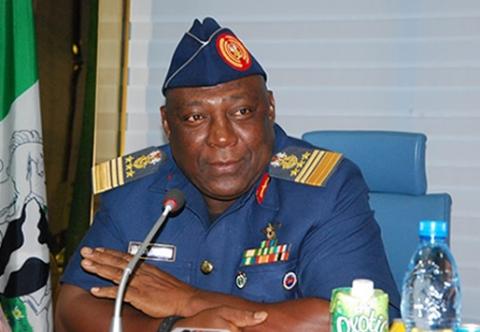Nigeria and Boko Haram 'agree ceasefire and girls' release'

Nigeria's chief of defence staff, Alex Badeh, announces the truce to the media
The BBC's Will Ross says the deal could be a "massive breakthrough"
Nigeria's military says it has agreed a ceasefire with Islamist militants Boko Haram - and that the schoolgirls the group has abducted will be released.
Nigeria's chief of defence staff, Alex Badeh, announced the truce. Boko Haram has not made a public statement.
The group has been fighting an insurgency since 2009, with some 2,000 civilians reportedly killed this year.
Boko Haram sparked global outrage six months ago by abducting more than 200 schoolgirls.
The girls were seized in the north-eastern town of Chibok in Borno state, and their continued captivity has led to criticism of the Nigerian government's efforts to secure their release.
Members of the Bring Back Our Girls campaign said in a tweet on Friday: "We are monitoring the news with huge expectations."
'Cautiously optimistic'
Air Chief Marshal Badeh revealed the truce at the close of a three-day security meeting between Nigeria and Cameroon. He said Nigerian soldiers would comply with the agreement.
Nigerian presidential aide Hassan Tukur told BBC Focus on Africa that the agreement was sealed after a month of negotiations, mediated by Chad.
As part of the talks, a government delegation twice met representatives of the Islamist group.
Mr Tukur said Boko Haram had announced a unilateral ceasefire on Thursday and the government had responded.
"They've assured us they have the girls and they will release them," he said.
"I am cautiously optimistic."
He said arrangements for their release would be finalised at another meeting next week in Chad's capital, Ndjamena.
The negotiations are said to have the blessing of Boko Haram leader Abubakar Shekau, reports the BBC's Chris Ewokor in Abuja.
Speaking to the BBC, Nigerian government spokesman Mike Omeri said Boko Haram would not be given territory under the ceasefire agreement - and that the government would not reveal what concessions it would make.
"We are inching closer to release of all groups in captivity, including the Chibok girls," he said.
Analysis: Will Ross, BBC News, Lagos
Nigerian officials had not given any indication that negotiations with Boko Haram were taking place. Even though there had been rumours of talks in neighbouring Chad, this is a very surprising development.
Many Nigerians are extremely sceptical about the announcement especially as there has been no definitive word from the jihadists.
The military has in the past released statements about the conflict in north-east Nigeria that have turned out to be completely at odds with the situation on the ground.
So many here will only celebrate when the violence stops and the hostages are free.
In May 2013, President Goodluck Jonathan imposed a state of emergency in the northern states of Borno, Yobe and Adamawa, vowing to crush the Islamist insurgency.
But Boko Haram increased its attacks this year.
The group promotes a version of Islam which makes it "haram", or forbidden, for Muslims to take part in any political or social activity associated with Western society.
It frequently attacks schools and colleges, which it sees as a symbol of Western culture.
Who are Boko Haram?
- Founded in 2002
- Initially focused on opposing Western education - Boko Haram means "Western education is forbidden" in the Hausa language
- Launched military operations in 2009 to create Islamic state
- Thousands killed, mostly in north-eastern Nigeria - also attacked police and UN headquarters in capital, Abuja
- Some three million people affected
- Declared terrorist group by US in 2013
Who are Boko Haram?
Profile: Boko Haram leader Abubakar Shekau
Human Rights Watch has reported that 2,053 civilian were killed in the first half of the year, while Amnesty International estimated that 4,000 people were killed in violence - including Nigerian military operations - in the first seven months of 2014.
Boko Haram is seeking to establish an Islamist state in Nigeria, but its fighters often cross the long and porous border with Cameroon.
Eight Cameroon soldiers and more than 100 Boko Haram militants were killed in fighting in the far north of Cameroon on Friday, Reuters quoted the country's defence ministry as saying.
In July, Cameroon, Nigeria, Chad and Niger agreed to form a 2,800-strong regional force to tackle Boko Haram militants.
Source: BBC News
